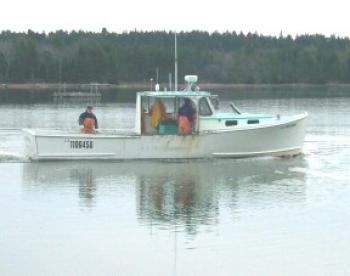James Richards

Finding Friendship Oral History Project
The Finding Friendship Oral History Project is a joint effort of the Friendship Museum and the Friendship Village School, directed by Sally Merrick, museum volunteer, and Gaylea Hynd, teacher. In 2003-2004 sixth grade students conducted taped interviews of three generations of lobstermen and women, as well as others associated with the lobstering industry. Printed copies of the interviews and CDs of the printed transcripts are available at the Friendship Museum in Friendship, Maine.
Jimmy
Jimmy Richards, a lifelong resident of Friendship, was born on October 16, 1965. He comes from a family of two sisters and one brother and now has two children of his own. With a passion for outdoor activities, Jimmy enjoys hunting, fishing, coin detecting, and participating in Little League. For more than 30 years, Jimmy, also known as James Richards, has been working as a lobsterman. His experience extends beyond lobstering to include ground fishing and scalloping. Throughout his career, he has acquired knowledge about his boat, equipment, traps, bait, and the process of hauling lobsters. Alongside his professional endeavors, Jimmy has also had some memorable experiences in his fishing adventures.
Scope and Content Note
James, a seasoned lobsterman, shares his journey and experiences with Jimmy. James developed a passion for lobstering as a child, accompanying his grandfather on trips. Now, as the captain of his own boat, "My Two Sons," he leads the operations, assisted by his son and brother during different seasons. Lobstering is a family tradition passed down through generations. James describes his boat and the tools he uses for successful lobstering. He explains the intricacies of his traps, including their size and construction. Buoy colors and personally built traps help distinguish his traps from others. He uses various bait options sourced from St. George Marine and follows a routine of baiting and hauling traps. When catching a lobster, James follows a meticulous process of measuring size, determining gender, and assessing whether it requires release. He also catches other fish species in his traps. At the end of the day, he unloads the lobsters at a shared wharf for the lobster buyer. The amount of lobster James hauls varies depending on the day, ranging from 100 to 1,000 pounds. Weather conditions, such as colder temperatures, affect lobster activity levels. James appreciates the freedom and autonomy of being his own boss, allowing him to balance work and personal life effectively. James faces challenges like foggy conditions, mechanical breakdowns, leaks, and collisions with other vessels. He overcomes these obstacles with resilience and experience. He vividly remembers hearing about the September 11th attacks while on the water, a significant moment that impacted him deeply. James recalls his first 1,000-pound haul as a memorable milestone. Finally, James reflects on the perseverance, resilience, and passion of a lobsterman.
Please Note: The oral histories in this collection are protected by copyright and have been created for educational, research and personal use as described by the Fair Use Doctrine in the U.S. Copyright law. Please reach out Voices@noaa.gov to let us know how these interviews are being used in your research, project, exhibit, etc. The Voices staff can help provide other useful resources related to your inquiry.
The NOAA mission is to understand and predict changes in climate, weather, oceans, and coasts, to share that knowledge and information with others, and to conserve and manage coastal and marine ecosystems and resources. The Voices Oral History Archives offers public access to a wide range of accounts, including historical materials that are products of their particular times, and may contain offensive language or negative stereotypes.
Voices Oral History Archives does not verify the accuracy of materials submitted to us. The opinions expressed in the interviews are those of the interviewee only. The interviews here have been made available to the public only after the interviewer has confirmed that they have obtained consent.
